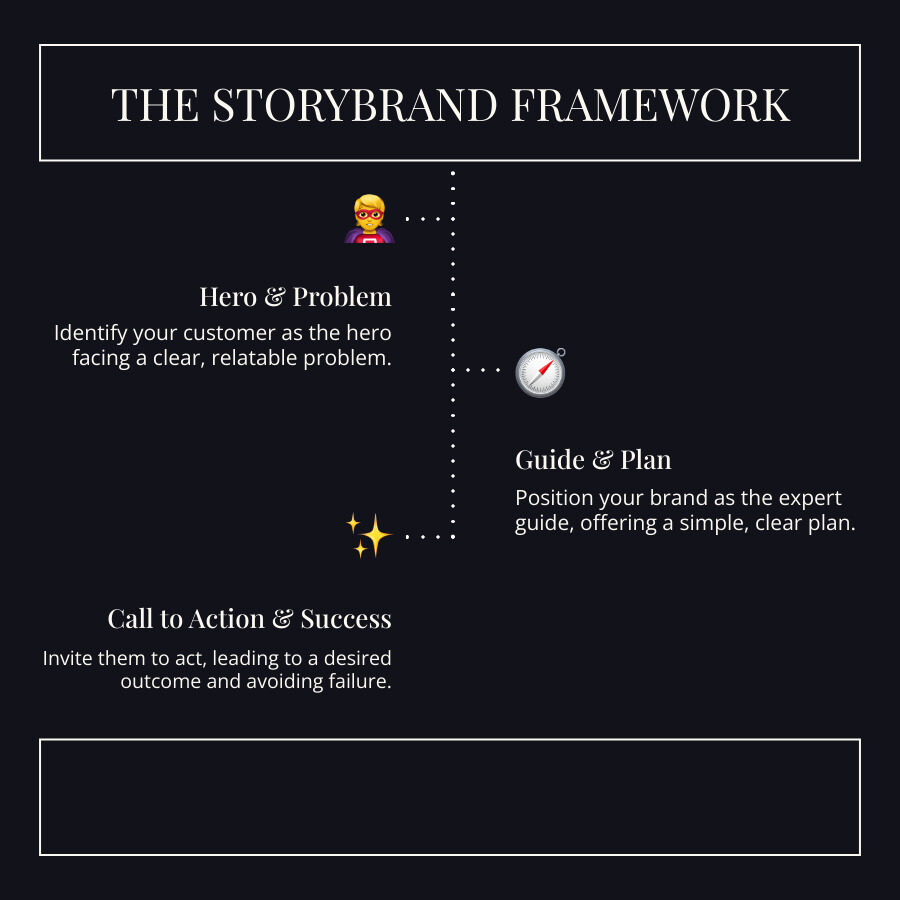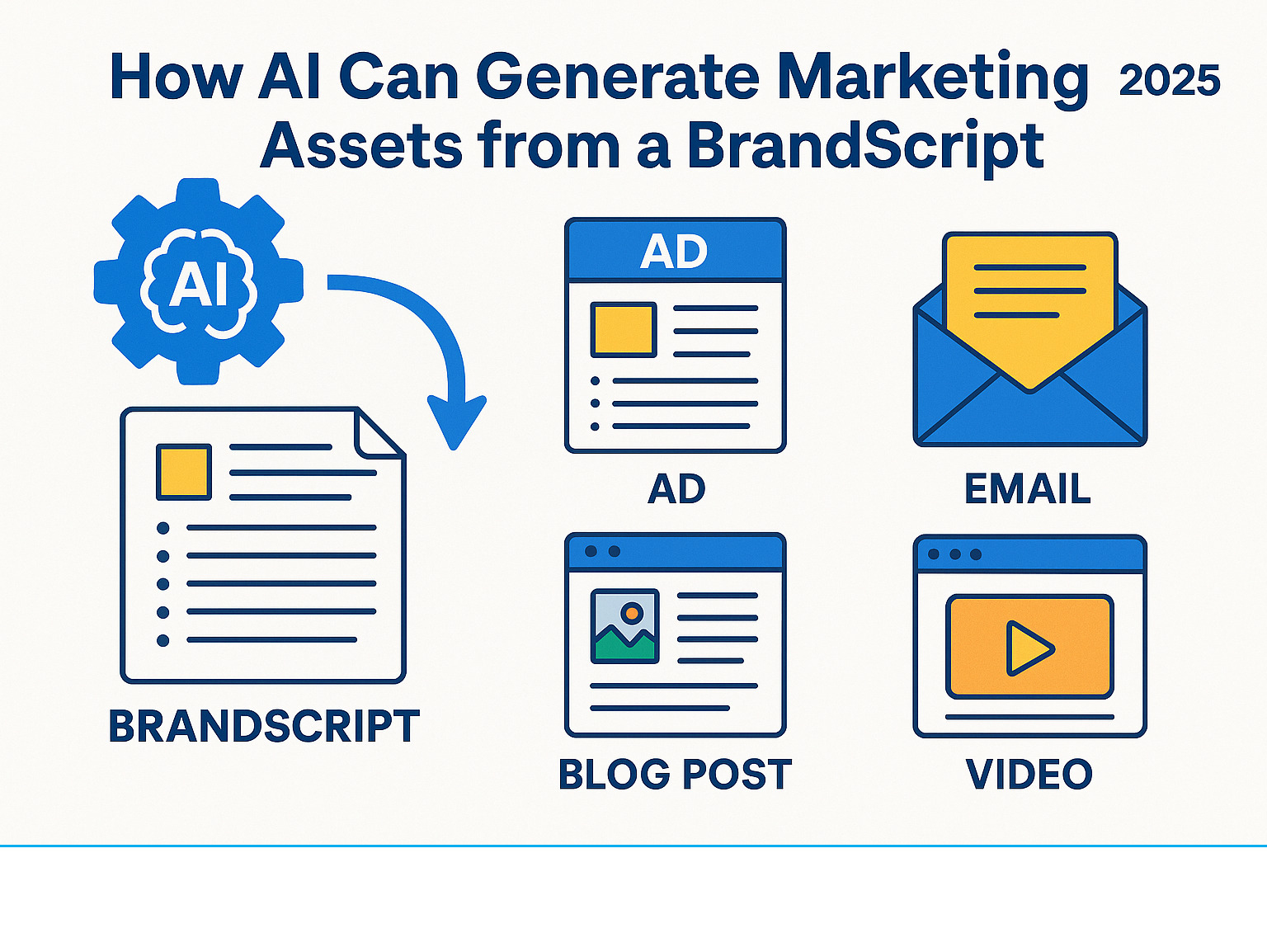The StoryBrand Framework: Your Secret Weapon for Marketing Success
Master story brand marketing to clarify your message, attract customers, and accelerate your tech business growth.
Master story brand marketing to clarify your message, attract customers, and accelerate your tech business growth.

Story brand marketing is a proven framework that clarifies a business's message by positioning the customer as the hero of the brand narrative. Instead of focusing on themselves, companies use this approach to highlight what customers want and how they can help them achieve it.
Key elements of story brand marketing:
For tech startups, this framework is especially powerful. Customers are bombarded with thousands of marketing messages daily. A confusing message means lost business to competitors with clearer value propositions. The StoryBrand framework, developed by Donald Miller, transforms how companies communicate by making complex products easy to understand.
Why story works for tech brands:
I'm Tony Crisp, and at CRISPx, I've helped tech companies from startups to Fortune 500 brands like Nvidia and HTC Vive build meaningful customer connections using story brand marketing principles. My experience has shown how powerful clear, customer-focused messaging is for product launches and market entry.

Basic story brand marketing terms:
Our brains are wired to process information through stories. The story brand marketing framework uses this universal structure to help tech brands build a BrandScript—a practical document that organizes your message into a narrative that connects with customers. It's a messaging blueprint that scales across every touchpoint.
For tech launches, a clear BrandScript is crucial. If customers can't quickly understand what you do, they'll move on. This framework provides a clear, story-based structure that cuts through the noise. It has seven parts that create a compelling customer journey, and understanding the behavioral science in marketing behind them shows why they're so effective.

Your customer is the hero of your brand story—not you or your product. This is the foundation of effective story brand marketing. Every hero wants something specific. For tech customers, this could be saving time, reducing costs, or growing their business. Get specific about their desires. Instead of generic buyer personas, focus on what your customer is trying to achieve, like a founder wanting to scale faster or a CTO needing to modernize systems without disruption. Nailing this desire clarifies all your messaging.
Every story needs conflict. In story brand marketing, we identify three levels of problems. The external problem is tangible: crashing software or scattered data. This is the surface-level frustration that brings customers to you. The internal problem is how that makes them feel: frustrated, stressed, or overwhelmed. This is where real connection happens. The philosophical problem adds moral weight: it's just wrong that innovative teams should be held back by inefficient technology. Addressing all three levels makes your message resonate far more deeply than a simple feature list.
Your brand enters the story as the wise guide, not the hero. Think Yoda to Luke Skywalker. You're the experienced mentor with the tools to help customers succeed. To be an effective guide, you need empathy and authority. Empathy shows you understand their struggle ('We know how frustrating it is...'). Authority proves you can solve it, using testimonials, case studies, or a clear explanation of your process. At CRISPx, our experience helping tech brands accelerate growth is our authority. The guide role positions your brand as helpful, not pushy, empowering your customer to be the star.
Confused customers don't buy. Uncertainty about the process stops them from moving forward. A simple plan removes this friction. Your plan should have three clear steps showing customers what to expect. For a tech product, this could be:
Each step focuses on the customer's experience, not your internal process. You can also include agreements like free trials or money-back guarantees to reduce risk and make it easier for customers to take the next step.
Every hero must act. In your brand story, this is your call to action (CTA). Be crystal clear about what you want customers to do next. Direct CTAs are for those ready to engage: 'Start Your Free Trial' or 'Schedule a Demo.' Place them prominently. Transitional CTAs nurture those not ready to buy. Offer valuable resources like a guide or webinar ('Download Our Implementation Guide'). These lead magnets build trust. Research from Unbounce's experiments on effective CTAs confirms that clarity and placement are key.
Paint a vivid picture of your customer's success state after using your solution. How does their life or business improve? Maybe they launch products 50% faster or reduce customer churn. Perhaps they finally sleep better at night knowing their systems are secure. The key is showing change, not just a transaction. This vision of the future motivates customers to act and is key to building brand equity for long-term success.
Every compelling story has stakes. In story brand marketing, you gently remind customers what happens if they don't solve their problem. This isn't fear-mongering; it's highlighting the cost of inaction. They might fall behind competitors or keep wasting time and money. The stakes create urgency, helping customers understand that the status quo is risky. Your solution doesn't just offer improvement; it helps them avoid being left behind. Combining all seven elements creates a narrative that engages customers emotionally and motivates them to act.
When we hear a story, our brains don't just process information; they experience it. This phenomenon, known as narrative transportation, is the secret weapon behind effective story brand marketing. Customers don't just understand your brand's story; they live it, putting themselves in the hero's shoes.

At CRISPx, we've seen this psychological principle transform how tech brands connect with audiences. It's a core part of our LaunchX approach because we know brand value starts with understanding the human brain. Our brains are hardwired to ask, 'How does this help me survive and thrive?' The StoryBrand framework taps directly into these instincts by showing how your product solves critical problems (survive) and helps achieve aspirations (thrive). This psychological alignment is explored in our work with marketing and behavioral science and is what makes story-driven messages so powerful.
Most companies get this wrong. They position themselves as the hero, talking about their own awards and innovations. This forces your customer, the hero of their own life, to take a backseat. In story brand marketing, making your customer the hero and your brand the wise guide aligns with their natural perspective.
This shift builds immediate trust. Instead of competing for attention, you're offering support. Instead of talking about yourself, you're talking about their success. This customer-focused approach is fundamental to building brand advocacy, as people champion brands that support their journey. At CRISPx, we help clients make this transition, making their messaging feel like helpful guidance, not advertising.
As the saying goes, 'If you confuse, you lose.' In a noisy digital world, customers will ignore a message that's hard to understand. Story brand marketing creates cognitive ease, so your customer's brain doesn't have to burn calories to grasp your value.
Clear messaging builds brand value by increasing conversions, as customers quickly see how you solve their problems. We've seen webinar sign-ups jump to 60% and businesses quadruple revenue just by clarifying their message. Clear stories also create strong brand recall, making it easy for customers to remember you and refer you to others, which is vital for increasing brand recognition. Most importantly, clarity builds the trust that becomes the foundation of lasting brand value.
Bringing your BrandScript to life is where the real change happens. Think of your BrandScript as your communication DNA, guiding every piece of content and customer interaction. This consistency turns casual browsers into loyal customers.
At CRISPx, we've seen how powerful this activation is. When tech brands implement their BrandScript systematically, they create messaging systems that scale with their growth. It's not just about having a good story—it's about telling it everywhere.

Your website must immediately tell visitors who you help, what problem you solve, and what to do next. The above-the-fold section is prime real estate. Your headline should speak to your customer's desire, not your company's achievements. For example, instead of 'We're innovators in cloud tech,' try 'Organize your team's data in minutes, not months.'
Your value proposition and visuals should reflect the customer's journey as the hero. Use clear CTAs with action-oriented language like 'Schedule Your Demo.' Don't forget transitional CTAs for those not ready to buy, offering valuable resources to capture their interest.
Story brand marketing makes email incredibly powerful. Your lead magnets should address specific problems your hero faces. A whitepaper on '5 Ways Data Chaos Kills Productivity' is more effective than a generic guide.
Use nurture sequences to guide prospects through their hero's journey: agitate the problem, position yourself as the guide, outline the plan, and call them to action. Structure blog posts and videos around customer problems, not product features. This approach is central to creative content marketing strategies that convert.
Even with a solid BrandScript, implementation can go wrong. Avoid these common mistakes:
Avoiding these pitfalls makes story brand marketing your secret weapon for cutting through market noise.
The magic happens when you combine timeless storytelling with cutting-edge technology. At CRISPx, we find that AI in brand marketing doesn't replace the human touch—it amplifies it, creating higher quality content with incredible efficiency. Think of AI as your tireless creative partner for executing your story brand marketing vision at scale.

Modern AI tools can revolutionize how you create marketing content. When trained on the principles of effective story-based marketing, these platforms truly understand the nuances of the framework.
Automated BrandScript creation becomes more intuitive with AI assistance. You provide the essential human insights about your customers, and AI helps structure them into a cohesive narrative. Once your BrandScript is solid, AI becomes a content powerhouse, generating sales emails, landing pages, and social media posts in minutes.
The beauty lies in consistency. AI ensures your brand story remains coherent across all touchpoints, which is crucial for brand recognition. This efficiency boost from AI-driven content marketing frees your team to focus on high-level strategy and customer understanding.
At CRISPx, our DOSE Method™ combines the emotional power of story with the precision of data. This is critical for tech product launches, where complex solutions need simple, compelling narratives.
This approach transforms storytelling from art into a blend of both art and science. It's the foundation of effective data-driven product marketing and essential for any successful tech product launch. By constantly measuring and refining your story, we ensure your message is not just creative—it's effective and profitable.
The story brand marketing framework is more than a tactic; it's a fundamental shift in how you connect with customers. By mastering this approach, you build a sustainable competitive advantage. While your competitors shout about themselves, you become the guide your customers have been searching for.
The benefits speak for themselves:
At CRISPx, our LaunchX approach uses these principles to help tech startups build powerful brand value from day one. Our OrbitX methodology takes this further, using psychological insights to execute growth marketing that truly connects. We understand that behind every click is a human looking for a guide.
We leverage AI to boost your storytelling, marrying the timeless power of narrative with cutting-edge technology. This data-driven creativity ensures your story brand marketing is compelling, measurable, and scalable.
Your competitors are still confusing their customers. You have the opportunity to be different. Don't let unclear messaging send another customer away. The StoryBrand framework, combined with CRISPx's expertise, gives you everything needed to clarify your message and build lasting brand value.
Ready to transform your marketing? It's time to launch your brand with a powerful story and make story brand marketing your unfair advantage in the marketplace.